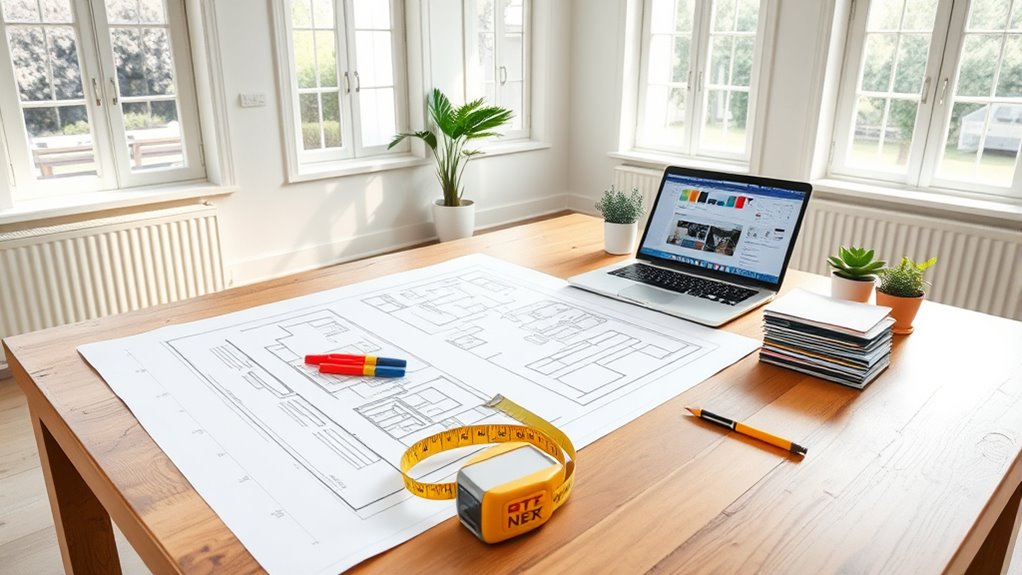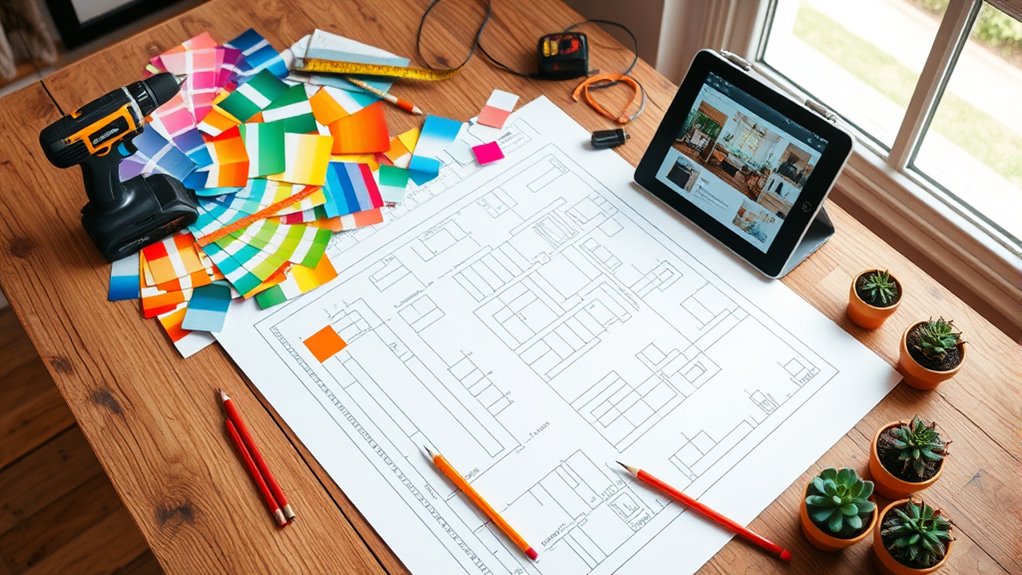To plan your home project effectively, start by setting a realistic budget covering materials, labor, and unexpected costs. Choose reliable contractors, clarify details upfront, and create a detailed timeline to keep everything on track. Regularly monitor spending and stay flexible to adjustments. Prioritizing clear communication and quality work helps prevent delays and overspending. Keep learning about budgeting tips and contractor selection to guarantee your project’s success from start to finish.
Key Takeaways
- Establish a realistic budget covering materials, labor, permits, and contingencies before starting your project.
- Research and select a reliable, licensed contractor with good references and clear communication.
- Set achievable timelines and maintain flexibility while ensuring deadlines are realistic.
- Create a detailed plan outlining project scope, materials, and payment terms to prevent misunderstandings.
- Regularly monitor expenses and progress, adjusting plans as needed to stay within budget and on schedule.
Effective Planning and Budgeting for Your Home Project

Starting a home project can be exciting, but it also requires careful planning to guarantee everything runs smoothly. One of the first steps is understanding your budget and how to stick to it. Budgeting tips are essential to avoid overspending or running out of funds halfway through the project. Begin by evaluating your financial situation and setting a realistic budget that covers materials, labor, permits, and a contingency fund for unexpected expenses. Break down your budget into categories so you can track spending more effectively. Prioritize what’s most important and be prepared to make adjustments if costs exceed your initial estimates. Having a clear financial plan helps prevent stress and keeps your project on track.
Once your budget is defined, choosing the right contractor becomes a critical decision. Contractor selection can make or break your project, so take the time to research thoroughly. Start by asking for recommendations from friends, family, or neighbors who’ve had similar work done. Check online reviews and verify credentials, licenses, and insurance to ensure you’re working with qualified professionals. Interview multiple contractors to compare their experience, work style, and pricing. Don’t just look at the bid; consider their communication skills, transparency, and whether they seem knowledgeable about your specific project. Request references and visit past jobs if possible. Trust your instincts—select a contractor who listens to your needs, offers clear explanations, and provides a detailed written estimate. Good communication and transparency at this stage can prevent misunderstandings and costly surprises later.
Planning ahead for contractor selection also involves setting realistic timelines. Be flexible but firm about deadlines, and make sure your contractor’s schedule aligns with your expectations. Clarify payment terms upfront, including deposits and progress payments, to avoid cash flow issues. Establishing a solid contract that details scope of work, materials, and timelines will give you legal protection and peace of mind. Remember, the cheapest bid isn’t always the best; quality work and reliable service often come with a higher price, but it’s worth investing in the right contractor to ensure your project’s success. Additionally, researching the best vacuums for various needs can improve your cleaning routine, especially if you want to maintain a healthy indoor environment during and after your home project.
Frequently Asked Questions
How Do I Choose the Right Contractor for My Project?
You should start by vetting contractors thoroughly, checking their references, and reviewing past work. Make sure they meet licensing requirements in your area to avoid scams or subpar quality. Get multiple quotes to compare pricing and timelines, and ask about their experience with similar projects. Trust your instincts—choose a contractor who communicates clearly, demonstrates professionalism, and seems genuinely interested in bringing your vision to life.
What Permits Are Required for My Home Improvement?
Permits for your home improvement are like the key to unlocking smooth progress. You’ll need to check local building codes and zoning laws to determine which permits apply, such as electrical, plumbing, or structural changes. Contact your city or county’s building department to get exact requirements. Skipping permits can lead to fines or having to undo work, so it’s best to secure all necessary approvals before starting.
How Can I Ensure Project Safety During Construction?
To guarantee safety during construction, you should follow strict safety protocols and prioritize hazard prevention. Wear appropriate personal protective equipment, like helmets and gloves, and keep the work area organized to prevent accidents. Regularly inspect tools and equipment for damage, and communicate clearly with everyone involved. Stay alert to potential risks and address hazards immediately, making safety your top priority throughout the project to protect yourself and others.
What Are Common Mistakes to Avoid in Home Planning?
You should watch out for budgeting pitfalls, like underestimating costs or forgetting hidden expenses, which can derail your project. Avoid design oversights by thoroughly researching and planning your layout, ensuring it fits your needs and space. Don’t rush decisions; take your time to review plans and consult professionals. Staying mindful of these common mistakes helps keep your home project on track, saving you stress, money, and future revisions.
How Do I Handle Unexpected Costs or Delays?
When unexpected costs or delays pop up, you should rely on contingency planning and budget flexibility. Keep a separate fund for surprises, so you’re not caught off guard. Communicate promptly with contractors or suppliers to understand the delays, and adjust your timeline accordingly. Staying adaptable and having a backup plan helps you manage setbacks without derailing your entire project. This approach keeps your project on track and reduces stress.
Conclusion
Remember, a well-planned home project is like building a sturdy house on a solid foundation. Stay organized, keep track of your budget, and don’t rush the process. When you plan carefully, you’ll avoid surprises and create a space you love. As the saying goes, “A stitch in time saves nine.” By investing a little effort upfront, you’ll save time, money, and stress down the road. Happy planning!









